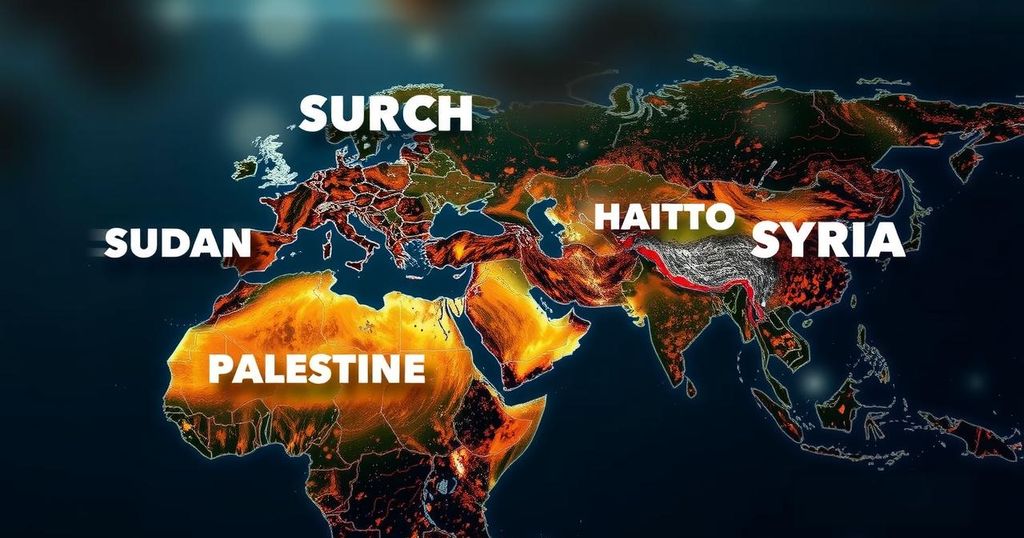Global Humanitarian Crises Demand Urgent Attention and Response
The article highlights urgent humanitarian crises in Sudan, the Occupied Palestinian Territory, Lebanon, Haiti, Ukraine, and Syria, emphasizing the dire need for international response. Key issues include violence against women and children, extensive displacement, and severe restrictions on aid delivery. Each region illustrates unique challenges, yet calls for urgent action are paramount across all fronts.
The global humanitarian landscape remains fraught with crises, as highlighted by the situations in Sudan, the Occupied Palestinian Territory, Lebanon, Haiti, Ukraine, and Syria. In Sudan, Under-Secretary-General for Humanitarian Affairs Tom Fletcher emphasizes the urgent need for international attention to the staggering humanitarian crisis generated by ongoing conflicts. During his visit, he highlighted the alarming levels of violence against women and girls, pressing for increased support and action to address these issues.
In the Occupied Palestinian Territory, heavy rainfall exacerbated the plight of over 1.6 million displaced individuals living in makeshift shelters, with significant flooding reported in Khan Younis and Gaza City. Humanitarian partners are striving to mobilize resources to address the damages, although they face severe restrictions.
Lebanon is currently experiencing unprecedented violence and a humanitarian crisis that has left over a million individuals affected, with rising casualty rates. UNICEF reported child deaths amid the ongoing conflict, forcing educational institutions to shift to remote learning methods.
In Haiti, on the International Day for the Elimination of Violence against Women, OCHA illuminated the troubling rise of gender-based violence, revealing that a significant number of incidents remain unreported. Furthermore, the recruitment of children by armed groups has surged.
In Ukraine, hostilities remain a constant threat, resulting in civilian casualties and substantial infrastructure damage amid freezing conditions. Humanitarian assistance continues to be a priority, particularly in regions lacking adequate heating.
Finally, the humanitarian situation in Syria escalates with ongoing attacks resulting in civilian deaths and significant funding shortfalls. More than 80 health facilities have suspended operations due to insufficient resources, indicating an urgent need for financial support to aid millions of vulnerable individuals.
Across these regions, the humanitarian needs are immense, challenging the international community to mobilize actionable responses amid escalating crises.
This report synthesizes key information on current humanitarian crises affecting various regions globally. These crises have engendered significant challenges, such as widespread displacement, violence against women and children, and severe restrictions on aid delivery. Each region faces unique circumstances, yet they share common themes of urgent need for humanitarian assistance, the detrimental impact of conflict on civilian populations, and the necessity for increased international support to mitigate these emergencies.
In conclusion, the humanitarian emergencies in Sudan, the Occupied Palestinian Territory, Lebanon, Haiti, Ukraine, and Syria call for immediate and sustained international intervention. The alarming trends of violence, especially against women and children, compounded by significant restrictions on humanitarian aid delivery, necessitate a cohesive response from the global community. Enhanced support is imperative to address these crises and alleviate the suffering of millions.
Original Source: www.unocha.org




Post Comment